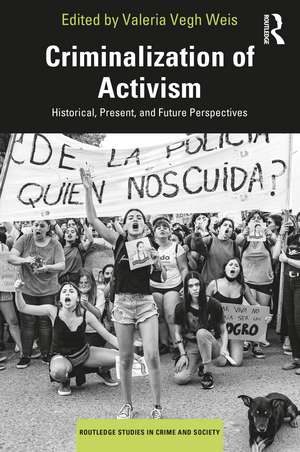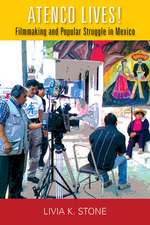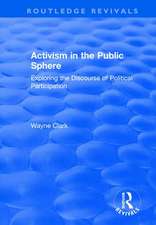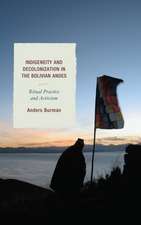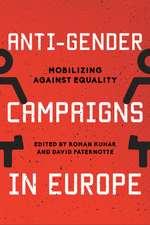Criminalization of Activism: Historical, Present and Future Perspectives: Routledge Studies in Crime and Society
Editat de Valeria Weisen Limba Engleză Paperback – 23 dec 2021
Criminalization of Activism draws on a multiplicity of perspectives and case studies from the Global South and the Global North to show how protest has been subject to processes of criminalization over time.
Contributors include scholars and activists from different disciplinary backgrounds, with a balance between authors from the Global North and the Global South. An introduction frames the topic within critical criminology, while also highlighting the possible disciplinary approaches and definitions of criminalization of resistance/activism. The editor also investigates the particularities of the current times in comparison to dynamics of criminalization in prior stages of capitalism. Bringing together a range of criminalization themes into a single volume, compromising historical criminology, Indigenous studies, gender studies, critical criminology, southern criminology and green criminology, it will be of great interest to scholars and students of criminology, social movement theory and social sciences, as well as those involved in activism and with a stand against criminalization.
Din seria Routledge Studies in Crime and Society
-
 Preț: 281.03 lei
Preț: 281.03 lei -
 Preț: 282.33 lei
Preț: 282.33 lei -
 Preț: 289.95 lei
Preț: 289.95 lei -
 Preț: 311.41 lei
Preț: 311.41 lei -
 Preț: 385.01 lei
Preț: 385.01 lei -
 Preț: 293.27 lei
Preț: 293.27 lei -
 Preț: 308.75 lei
Preț: 308.75 lei -
 Preț: 323.86 lei
Preț: 323.86 lei -
 Preț: 294.20 lei
Preț: 294.20 lei - 20%
 Preț: 279.06 lei
Preț: 279.06 lei - 9%
 Preț: 934.77 lei
Preț: 934.77 lei - 9%
 Preț: 935.92 lei
Preț: 935.92 lei -
 Preț: 346.91 lei
Preț: 346.91 lei -
 Preț: 437.34 lei
Preț: 437.34 lei -
 Preț: 469.34 lei
Preț: 469.34 lei -
 Preț: 469.34 lei
Preț: 469.34 lei -
 Preț: 430.37 lei
Preț: 430.37 lei -
 Preț: 384.59 lei
Preț: 384.59 lei - 18%
 Preț: 997.11 lei
Preț: 997.11 lei - 18%
 Preț: 996.33 lei
Preț: 996.33 lei - 18%
 Preț: 1108.42 lei
Preț: 1108.42 lei - 18%
 Preț: 1006.60 lei
Preț: 1006.60 lei - 14%
 Preț: 325.34 lei
Preț: 325.34 lei - 18%
 Preț: 1056.00 lei
Preț: 1056.00 lei -
 Preț: 348.77 lei
Preț: 348.77 lei -
 Preț: 240.38 lei
Preț: 240.38 lei - 12%
 Preț: 312.43 lei
Preț: 312.43 lei -
 Preț: 277.78 lei
Preț: 277.78 lei - 18%
 Preț: 1009.55 lei
Preț: 1009.55 lei - 13%
 Preț: 336.90 lei
Preț: 336.90 lei - 18%
 Preț: 1001.84 lei
Preț: 1001.84 lei - 20%
 Preț: 1104.66 lei
Preț: 1104.66 lei - 18%
 Preț: 1051.55 lei
Preț: 1051.55 lei - 20%
 Preț: 1048.59 lei
Preț: 1048.59 lei -
 Preț: 409.90 lei
Preț: 409.90 lei - 16%
 Preț: 325.34 lei
Preț: 325.34 lei - 18%
 Preț: 1161.10 lei
Preț: 1161.10 lei - 26%
 Preț: 764.77 lei
Preț: 764.77 lei - 20%
 Preț: 1042.80 lei
Preț: 1042.80 lei
Preț: 420.97 lei
Nou
80.55€ • 87.77$ • 67.88£
Carte tipărită la comandă
Livrare economică 23 aprilie-07 mai
Specificații
ISBN-10: 0367700115
Pagini: 286
Ilustrații: 4 Tables, black and white; 4 Line drawings, black and white; 1 Halftones, black and white; 5 Illustrations, black and white; 4 Tables, black and white; 4 Line drawings, black and white; 1 Halftones, b
Dimensiuni: 156 x 234 x 15 mm
Greutate: 0.41 kg
Ediția:1
Editura: Taylor & Francis
Colecția Routledge
Seria Routledge Studies in Crime and Society
Locul publicării:Oxford, United Kingdom
Public țintă
Postgraduate and Undergraduate AdvancedCuprins
Preface by Dario Melossi
Introduction
Part 1. THEORETICAL APPROACHES ON THE OVER-CRIMINALIZATION OF DISSENT
1. Politics of Exception. Criminalizing Activism in Western European Democracies by Katharina Fritsch and Andrea Kretschmann.
2. A Social Control Perspective for the Study of Environmental Harm and Resistance by Alida Szalai
3. The Criminalization and ‘Innovation’ of Resistance. Looking at the Italian Case by Verónica Marchio
Part 2. HISTORICAL EXPERIENCES OF OVER-CRIMINALIZATION OF DISSENT
1. Avoiding and Amplifying the Criminal Label in The Roman Republic and Medieval England by Matt Clement
2. The Criminalization of Low-Rank Castes: A Historical Perspective of Mahad Movement in India (1927-1937) by Kruthi Jagadish Kumar, Praveenrao Bolli and Myrna Cintron
3. "Loyal Spear-Carriers": Police Violence in the Queensland Anti-Apartheid Movement, 1971 by Paul Bleakley
4. The Theorem of National Solidarity. Italy and the "7 Aprile" Case. The Criminalisation of Left-Wing Dissent by Vincenzo Scalia
Part 3. CURRENT CASES OF OVER-CRIMINALIZATION OF DISSENT IN THE GLOBAL NORTH
USA
1. Resistance to Survive: The Criminalization of the Black Lives Matter Movement by Teresa Francis Divine and Ginny Norris Blackson
2. Between Crime and War: The Security Model of Protest Policing by Paul A. Passavant
EUROPE
3. Fighting for the Right to Save Others: Responses by Civil Society to the Criminalisation of Solidarity in the Mediterranean Sea post-2015 by Christal Chapman ‘
4. Media Representation of Belgian Youth Protests: The Making of ‘Climate Truants’ by Mafalda Pardal, Celine Tack and Frédérique Bawin
5. Criminalization as Strategy of Power: The Case of Catalunya 2017-2020 by Ignasi Bernat and David Whyte
Part 4. CURRENT CASES OF OVER-CRIMINALIZATION OF DISSENT IN THE GLOBAL SOUTH
1. Protest and Punitive Treatment in Argentina: An Analysis from Latin American Critical Criminology by Gabriela L. Gusis and Rodrigo F. Videla
2. Colombia’s Murderous Democracy Pre- and Post-Covid-19: The Assassination of Social Leaders and the Criminalization of Protest by Natalia Ruiz Morato
3. Violence and Violations of Rights against Leaderships in the Brazilian Amazon by Paula Lacerda and Igor Rolemberg
4. An Analysis of the Criminalisation of Socio-Environmental Activism and Resistance in Contemporary Latin America by Israel Celi, Roxana Pessoa Cavalcanti and Grace Iara Souza
5. Notes from the Field: The judicial persecution in the Amazonian Indigenous Struggle- "El Baguazo" -Amazonas-Peru by Saúl Puerta Peña-Pueblo Awajun
Part 5. CHALLENGES FOR A CRITICAL AGENDA ON THE OVER-CRIMINALIZATION OF DISSENT
1. Artificial Intelligence and the Criminalisation of Activism by Mark Cowling
2. Covid Cops: A Recent History of Pandemic Policing during the Coronavirus Crisis by Greg Martin
3. Punitive Feminism (or When and Why Did We Start Dividing the World between Good and Evil, rather than between Oppressed and Oppressors) by Tamar Pitch
4. Genocidal Activism and the Language of Criminality: Reflections on the Duality of the Nazi-Era and the Avoidance of Engagement with Histories of Social and Political Activism at the Nuremberg Trials by Wayne Morrison
Index
Notă biografică
Vegh Weis holds a Ph.D. in Law and an LL.M. in Criminal Law from UBA and an LL.M. in International Legal Studies from New York University. She has held different fellowships including the Alexander von Humboldt (Germany), the Fulbright and the Hauser Global (USA).
Her first book Marxism and Criminology: A History of Criminal Selectivity (BRILL 2017, Haymarket Books 2018) was awarded the Choice Award by the American Library Association and the Outstanding Book Award by the Academy of Criminal Justice Sciences. She is also the co-author of Bienvenidos al Lawfare with Raúl Zaffaroni anc Cristina Caamaño (Capital Intelectual 2020) which was translated into Portuguese and English, as well as many articles and book chapters in the topics of criminology, transitional justice and criminal law. She has 15 years of experience working in criminal courts and international organizations.
Recenzii
‘This impressive collection of empirical and theoretical interventions show that as much as policing is a tool to manage unique local challenges to state authority, there are also remarkable global continuities. Throughout much of the world, police have become the primary tool for managing social movements erupting out of the contradictions of neoliberal austerity through a process of criminalizing dissent. This process is rooted not in the rule of law, but instead in a "state of exception" in which the perpetuation of state-backed regimes of exploitation trump legal frameworks and liberal democratic processes. In the end, this volume forces us to question the fundamental legitimacy of political policing and the political economic arrangements they enable.’-Alex S. Vitale, Author of The End of Policing
‘At a time in which a global police state is in the making, this is a most opportune book. It must be read by all democrats because democracy is precisely what is at risk.’
Boaventura de Sousa Santos, Author of Toward a New Legal Common Sense
‘The criminalization of activism, political dissidence and even the criminalization of the exercise of certain professions itself is more and more extensive in various areas of the world. When this work is published I do not even know how the criminal proceedings initiated against me by prison unions will be found for my denunciation of torture in prisons in Catalonia. Teachers, activists, musicians, graffiti artists, poets ... there is no specific profile. Criminalization increases in a similar proportion to the loss of rights and guarantees. But, for that reason, the (collective) struggle is more necessary than ever. As Walter Benjamin pointed out forever, "let us know how to organize pessimism’-Iñaki Rivera Beiras, Professor at the University of Barcelona, Director of the Observatory of the Penal System and Human Rights
‘This is a fascinating collection that provides a great deal of valuable empirical information and rich theoretical insights about the ways in which protest and dissent can become criminalized. The case materials cover a broad geographic range and include both contemporary and historical protests. The editor’s introduction provides a valuable framework for understanding both the under-criminalization of actions by the state, state agents and powerful elites that harm people and the over-criminalization of actions by the oppressed to survive and resist harm.’ -Pamela Oliver, Professor Emerita of Sociology at the University of Wisconsin
‘This is a much required work in contemporary times when neoliberal authoritarianism is involved in redefining the idea of 'democracy' itself. It shows one of the many ways in which neoliberal capitalism tries to exercise control of state over its citizens towards an unchallenged hegemonic ideological order. This dissent is no longer limited to only those who want to overthrow the state but even those who seek reforms that may impact interests of capital in specific ways. This work will go a long way as a reference material for anyone researching on democracy and modern nation state.’-Ravi Kumar, Associate Professor at the Department of Sociology, South Asian University
‘This book makes a significant contribution to debates in the arena of social movements. It tells us responsible thinking (inside and outside the university) is treated as criminal and repressive brutality against such thinking is endorsed as legitimate activity. This is not a recent phenomenon. It has criminalized society and, has messed up social institutions, public spaces and everyday life. For the activists, it draws attention to the need for perseverance over several generations to make people at large see the creative significance of saying ‘no’ as a mode of opening up diverse ways seeing and living in this world.’-Savyasaachi, Professor at the Department of Sociology, Jamia Millia Islamia
‘It would be impossible to over-emphasize the temporal significance of this book. As we enter an era of intensified criminalization of activism and dissent, bolstered by the impacts of the globalized policing of the Covid pandemic and further enabled by a proliferation of Artificial Intelligence, there could not be a better time to reflect on histories of criminalization and the importance of sustained activism in the face of violence and repression. In this edited volume, Valeria Vegh Weis has drawn together an exemplary collection of interdisciplinary scholar-activists focusing on such issues. Concept, theory and action are combined with issues of historic and contemporary significance – from environmental harm to the Nuremberg Trials to Black Lives Matter; India to Catalonia and Latin America, the breadth and depth of this book is astounding. It is essential reading for anyone interested in social control and the criminalization of activism and dissent.’ -Victoria Canning, Senior Lecturer in Criminology at University of Bristol, Co-coordinator of theEuropean Group for the Study of Deviance and Social Control, Associate Director ofOxford Border Criminologies
Descriere
Criminalization of Activism draws on a multiplicity of perspectives and case studies from the Global South and the Global North to show how protest has been subject to processes of criminalization over time.
Contributors include scholars and activists from different disciplinary backgrounds, with a balance between authors from the Global North and the Global South. An introduction frames the topic within critical criminology, while also highlighting the possible disciplinary approaches and definitions of criminalization of resistance/activism. The editor also investigates the particularities of the current times in comparison to dynamics of criminalization in prior stages of capitalism. Bringing together a range of criminalization themes into a single volume, compromising historical criminology, Indigenous studies, gender studies, critical criminology, southern criminology and green criminology, it will be of great interest to scholars and students of criminology, social movement theory and social sciences, as well as those involved in activism and with a stand against criminalization.
